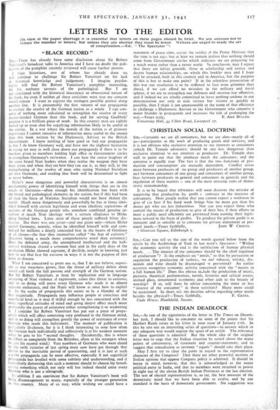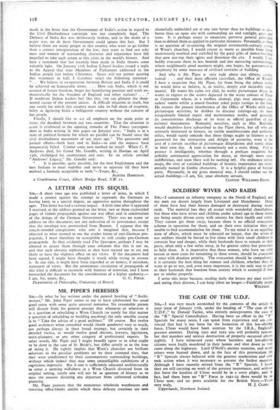THE INDIAN DEADLOCK
SIR,—AS one of the signatories of the letter to The Times on Decem- ber 30th, I should like to con.ment on some of the points that Sir Herbert Kealy raises in his letter in your issue of January 17th. In this he sets out an interesting series of questions—to answer which in any adequate way would require the space of an article The relevancy of these questions is admitted But the whole idea of the original letter was to urge that the Indian situation be raised above the many points of controversy; of statement and counter-statement; and to suggest that consultation as oetween " equals " should take their place.
May I first try to clear the point in regard to the representative character of the Congress? That there are other powerful sections of Indian opinion that oppose Congress policy is admitted. It should be borne in mind, however, that this is acknowledged as the major political party in India, and that its members were returned to power in eight out of the eleven British Indian Provinces at the last election. The test of elected representatives is, so tar, the best measure of the democratic mind that we have been able to evolve, and by our standard is the basis of democratic government. No suggestion was
made in the letter that the Government of India's action in regard to the Civil Disobedience campaign was not completely legal. The Defence of India Act was deliberately broken, and in the midst of a major war, no de facto Government could ignore this fact. But I believe there are many people in this country who want to go farther than a correct interpretation of the law; they want to find out why men and women of outstanding character and experience have felt impelled to take such action at this crisis in the world's history. And here a statement that has recently been made in India throws some valuable light. On January 17th Indian Liberal leaders issued a reply to the Appeal that nine Members of Parliament addressed to the Indian people just before Christmas. Space will not permit quoting this statement in full; I tl.erefore select the following sentence: " . . We believe in co-operation between Britain and India if it could be achieved on honourable terms. . . . How can India, which is not assured of future freedom, forget her humiliating position and work en- thusiastically for the freedom of England and other nations? . . ." If moderate Indian leaders feel like this, one can glimpse the deep- seated causes of the present unrest. A difficult situation in truth, but one surely for which this country must take its full share of responsi- bility in declaring India a belligerent country without the consent of her people.
Finally, I should like to iny all emphasis on the main point at issue; the deadlock between our two countries. That the situation is acute is evidenced in the opening remarks of The Times correspon- dent in India writing in that paper- on January 21st: "India is in a state of political ferment for which no parallel can be found since the civil disobedience movement of ten years ago." The persistent and patient efforts—both here and in India—to end the impasse have temporarily failed. Cannot some new method be tried? When C. F. Andrews died, his friend Mr. Gandhi, writing in Harijan on April 13th, challenged his countrymen and ours. In an article entitled "Andrews' Legacy," Mr. Gandhi said:
" • . It is possible, quite possible, for the best Englishmen and the best Indians to meet together and never to separate till they have evolved a formula acceptable to both."—Yours, &c,































 Previous page
Previous page